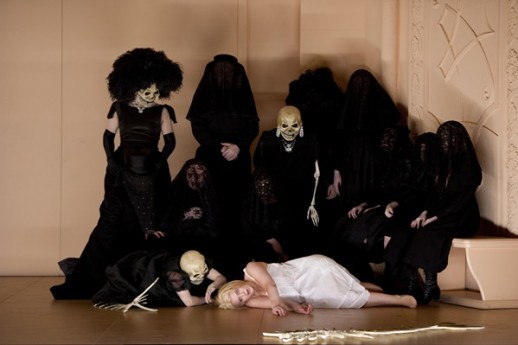
Doesn’t Rusalka have the same story as The Little Mermaid except that it has the original un-Disneyfied unhappy ending where the mer-soprano kills her true love and is condemned to hell? Well, yes, but as one would expect of a good Regie production, conveying the plot of Rusalka, which Kosky does exceptionally well, is only half the job of the opera director. He must also present the “meaning” of the work, which he sees as an allegory for the life of a performing artist.
The set, such as it is, is a shallow room with a single narrow door and a bench. It is painted and decorated to match and extend the proscenium onto the stage. Whenever the door at the back opens, one only sees an inky blackness. The playing area then is meant to be seen as a performance space, defined by the actions that take place in it and completely independent of the world around it. It is the world that Rusalka wants to inhabit, so she can enact the feelings she so desperately wants to experience.
Rusalka slithers into this space, unable to stand or do much other than express her wish to portray a human. She cannot actually be a human because she lacks soul. This is a daunting task for any artist and the Water Gnome, who is seated up in the balcony, warns her that she is playing to a very tough room, but she persists. Her performance is tentative, touching and ultimately unconvincing She tries to dance with the Prince in Act II and has two left fins feet.
She fails as performer because she has no soul and is a cold fish, literally and figuratively. After she is rejected and contemplating her miserable situation at the start of Act III, her world implodes around her. In the most striking image of the opera (spoiler alert) and indeed one of the most stunning visual effects I’ve seen on the stage, the stage wobbles and destabilizes around her as when in a sci-fi film reality appears on the verge of collapse. She ends the opera trapped in a hellish limbo.
I found this interpretation of Rusalka to be a very compelling one and my only significant criticism of the production (other than the fact that it featured extraordinarily noxious stage tobacco) was that it explored this perspective very intermittently and I would have expected this perspective to be more integrated with the staging. Still there was ample satisfaction to be found in Kosky’s telling of the story.
True, there was little for purists to find comfort in. No trees, no moon, no Mylar pretending to be water. Even the witch Jezibaba was not the funny-creepy none too threatening crone that we have come to expect. She was truly intimidating and the scene where she transforms Rusalka into a human was brutal and gruesome. Poor Rusalka was splayed on a metal cart; the witch cut off the fish skin on the lower half of her body; yanked out her fish skeleton, and then force-fed her the blood and entrails of a cat who had been fed the required ingredients to make the transforming potion.
We saw the second cast of the production; nonetheless the overall ensemble was extremely tight and there were two standout performers. Keep your eyes out for the Latvian soprano Asmik Grigorian who sang with a fine balance of delicacy and ardor. She had power on reserve for the big climaxes and a seemingly limitless amount of energy necessary for the very demanding staging. Mirka Wagner, in the much smaller role of the First Forest Nixie (as Anna Russell might call her) made a very striking impression in her luminous solo in the last act.
Jeffrey Dowd was rather a strapping cipher as the Prince, but this seemed to be the director’s intention. His voice sounded constricted in the big climaxes and he struggled with the difficult music at the opera’s very end. Manuela Bress was suitably intimidating as Jezibaba and Jens Larsen was both imposing and tender as the Water Gnome. Barbara Schneider-Hofstetter whooped and grimaced her way through the role of the Foreign Princess. One hopes for her sake that both were intentional. Patrick Lange, the music director of the Komsiche Oper, led an energetic, soulful performance that struck me as very loud. Given the relatively small theater, the singers could still penetrate the din
This is the third high-profile production of Rusalka in Europe this season. Each one has found very different ways of telling this story of this very grim fairy tale. I’m not sure why she is this year’s Regie It Girl, but I’m envious of European audiences that get to experience this hearty feast while we back in New York we have a Rusalka production that is all empty calories.



